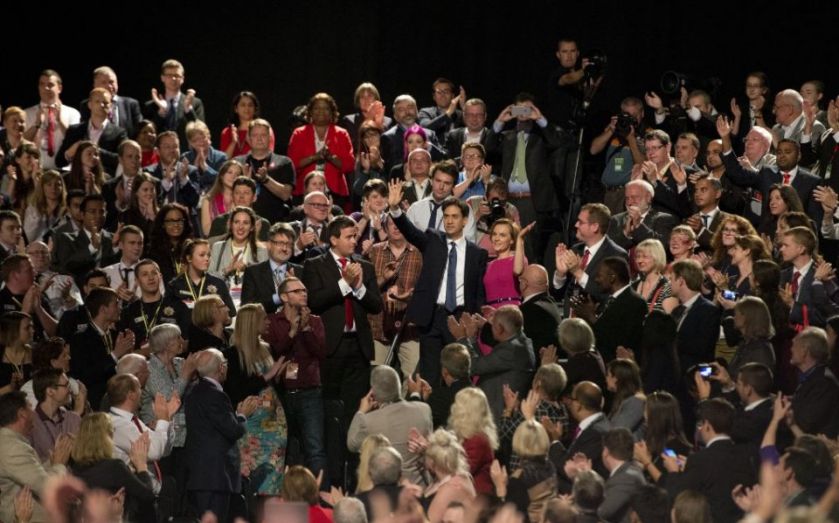Ed Miliband’s conference speech: Here’s what you need to know

Ed Miliband has delivered his last speech to a Labour conference before the 2015 general election.
The Labour leader hopes his six-point plan will be enough to entice voters to give his party the keys to Downing Street and reverse his low personal ratings. The plan is intended to be implemented over 10 years.
Here are the key takeaways of Ed Miliband's pitch to the British electorate, which lasted almost 80 minutes.
More: Critics slam Miliband's mansion tax plans
NHS
The tobacco industry will be hit with a fresh tax to plough money back into the NHS.
The Tobacco Manufacturers Association (TMA) responded:
This anti-business idea is illogical and ignores a major cause of lost tobacco tax, the illegal market. Rather than coming up with ways to attack a legitimate UK business sector, selling a legal product which already contributes £12.3bn per year in tax, the Labour party should be thinking of how to claw back the billions in revenue the government loses through sales of illegal tobacco in the UK.
Furthermore, proceeds from a tax to be levied on properties worth over £2m will be used to pay for a "time to care fund". Worth £2.5bn, the fund will support 20,000 more nurses, 8,000 extra GPs, 5,000 care workers and 3,000 more midwives. Hedge funds will be subjected to extra measures to clamp down on tax avoidance.
Labour promised to repeal the coalition's Health and Social Care Act. The prospect of higher taxes has already been greeted with hostility from campaigning organisations.
Jonathan Isaby, chief executive of the TaxPayers' Alliance, said:
This was sixth form socialism of the most uninspiring kind. It is lazy and dangerous to implement populist measures that won't raise the money politicians promise. Windfall taxes will hurt pensioners who rely on stable returns for a comfortable retirement, sin taxes hit the poorest hardest, and a Mansion Tax would be a vindictive gesture that will eventually find its way down the property ladder to hit much less expensive homes, too.
Green jobs
Labour promised one million "green jobs" by 2025 and higher spending on low-carbon technologies and support for an international climate change agreement at the 2015 Paris conference. The government's Green Investment Bank will be given the power to borrow, and five million homes will be insulated over the next 10 years.
Minimum wage hike
Under an Ed Miliband government, the national minimum wage will be raised to £8 over the next five years. Employers who break the rules will suffer a £50,000 fine.
On Sunday, the director general of the Institute of Directors (IoD) responded to Labour's proposals:
The only sustainable drivers of wage growth are productivity gains and improvements in company performance. Allowing wage rates to be determined by anything other than these measures would be a risky move. Politicians should address the underlying issues holding back pay rises, and must resist the temptation to turn the general election into a wage auction.
Mansion tax
Homes worth over £2m will be taxed. The new taxes are calculated to raise £1.2bn. The proposal has not been received with universal acclaim.
Head of policy at the Adam Smith Institute (ASI) Ben Southwood:
Labour’s proposal to tax expensive houses and hypothecate the funds for the NHS is bizarre. Although property value taxes are among the least inefficient taxes, and shifting the burden from costlier taxes like stamp duty land tax, corporation tax and income tax is a good idea, we already have a perfectly good property tax system: council tax.
Nick Leeming, chairman of estate agent Jackson-Stops & Staff:
The Downton Abbey view of politics is distorting the realities of who own homes in the £2m plus bracket. This will affect people all over the country, not just in London where the market has been most buoyant.
Labour's tax amounts to an average of £12,370 a year, based on figures from Savills.
House building
Labour has pledged to build 200,000 homes a year until 2020 and will grant so-called "use it or lose it " powers to local councils. By 2025, the number of first-time buyers will have doubled if Labour is successful.
Apprenticeships
By 2025, Labour hopes as many young people will be getting apprenticeships as will be going to university. If employers hire workers from outside the EU they will also have to take on British apprentices. Furthermore, firms that win government contracts will be required to take on apprentices.
EU
Ed Miliband told the conference hall the EU needed reform but said Britain's future lay inside the EU.
Votes for the young
If Labour wins next year 16 and 17-year-olds will be given the vote.
House of Lords reform
Miliband said he hoped to turn the House of Lords into a senate.
While the speech may have gone down well with party activists many have continued to voice concerns over Labour's economic credibility. Yesterday, the Centre for Policy Studies (CPS) published economic analysis showing that Labour's tax policies could cost the UK over 300,000 jobs and more than £25bn in GDP.